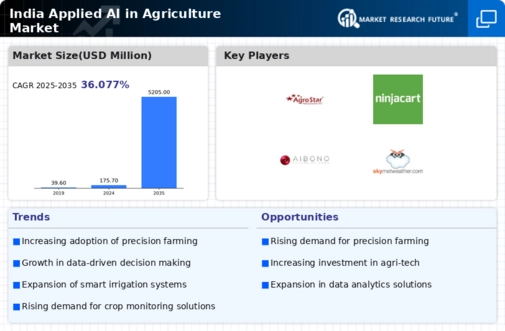Growing Awareness and Education
The increasing awareness and education regarding the benefits of AI in agriculture are pivotal for the applied ai-in-agriculture market. Farmers are becoming more informed about how AI technologies can enhance their productivity and profitability. Educational programs and workshops are being organized to demonstrate the practical applications of AI in farming. This knowledge dissemination is crucial, as it empowers farmers to adopt new technologies confidently. Furthermore, as agricultural universities and institutions incorporate AI into their curricula, the next generation of farmers is likely to be more adept at utilizing these tools. This growing awareness is expected to lead to a broader acceptance of AI solutions, thereby propelling the applied ai-in-agriculture market forward.
Rising Demand for Food Security
The growing population in India is intensifying the demand for food security, which is a significant driver for the applied ai-in-agriculture market. As the population is projected to reach 1.5 billion by 2030, the pressure on agricultural productivity is mounting. AI technologies can assist in maximizing crop yields and minimizing losses through predictive analytics and real-time monitoring. The applied ai-in-agriculture market is expected to benefit from this trend, as farmers seek innovative solutions to meet the increasing food demand. Moreover, the integration of AI can lead to more efficient resource utilization, reducing waste and enhancing sustainability. This alignment with food security goals positions the applied ai-in-agriculture market as a vital component in addressing future agricultural challenges.
Technological Advancements in AI
The rapid evolution of artificial intelligence technologies is a primary driver for the applied ai-in-agriculture market. Innovations in machine learning, computer vision, and data analytics are enabling farmers to optimize their operations. For instance, AI algorithms can analyze vast datasets to provide insights on soil health, crop conditions, and pest management. In India, the market for AI in agriculture is projected to reach approximately $2.6 billion by 2025, reflecting a compound annual growth rate (CAGR) of around 25%. This growth is largely attributed to the increasing adoption of smart farming techniques, which leverage AI to enhance productivity and sustainability. As farmers become more aware of these technologies, the demand for AI-driven solutions is likely to surge, further propelling the applied ai-in-agriculture market.
Government Initiatives and Support
Government policies and initiatives play a crucial role in fostering the applied ai-in-agriculture market. The Indian government has been actively promoting the use of technology in agriculture through various schemes and subsidies. Programs aimed at digitizing agriculture and enhancing farmers' access to AI tools are gaining traction. For example, the Digital India initiative encourages the integration of technology in farming practices. Additionally, the government has allocated substantial funds to support research and development in agricultural technologies, which is expected to boost the applied ai-in-agriculture market. With an increasing focus on food security and sustainable practices, government backing is likely to enhance the adoption of AI solutions among farmers, thereby driving market growth.
Increased Investment in Agri-Tech Startups
The surge in investment in agri-tech startups is significantly influencing the applied ai-in-agriculture market. Investors are increasingly recognizing the potential of AI-driven solutions to transform traditional farming practices. In recent years, funding for agri-tech ventures in India has seen a remarkable increase, with investments reaching over $1 billion in 2025 alone. This influx of capital is facilitating the development of innovative AI applications tailored for the agricultural sector. Startups are focusing on areas such as precision farming, crop health monitoring, and supply chain optimization, which are essential for enhancing productivity. As these startups continue to innovate and scale, they are likely to drive the growth of the applied ai-in-agriculture market, creating a dynamic ecosystem for technological advancement.
















